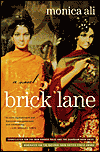
Brick Lane is not a Goddess novel, but its theme of finding your own identity against all odds is so vital that anyone who is working to return the world to the Goddess and to the partnership paradigm will respond to this story of a young Bangladeshi woman living in London. The book opens with Nazneen’s birth in a tiny village in Bangladesh. The baby isn’t breathing and refuses to nurse. The mother says, “Of course, Fate will decide everything in the end, whatever route you follow.”
Nazneen survives and at age eighteen is given in an arranged marriage to Chanu, a Bangladeshi forty years her senior who is living in London. A proper Muslim wife, she takes up residence in a tiny slum apartment crowded with her husband’s books and furniture. Chanu does not beat her, which makes him a good husband. He is also naïve and full of plans for the future but fuller of resentment against bigotry, racism, and his many failures in the white world. Eventually, even though he is well educated, he becomes a cab driver. Then he decides to go home to Bangladesh, where he believes he will be more successful.
The terrorist attacks of 9/11 occur about half-way through the book. At the same time, Chanu has bought Nazneen a sewing machine, and a handsome young radical named Karim brings clothes to her to sew. (She’s her own sweatshop.) As they begin an affair, Nazneen attends meetings of young Muslims who are trying to understand the world and fight back against attacks by skinheads. As her community is radicalized, Nazneen goes through some extraordinary life changes, especially in her perception of herself, her role in her marriage, and her responsibilities to her god, her dead mother (who occasionally visits and talks to her), her husband, her lover, and her daughters.
When we see the Muslim world in the news, the streets are full of men. In Brick Lane, however, it’s the female characters that we see most often. There is Mrs. Islam, a hypochondriac and a loan shark who bullies the Bangla community with her two thuggish sons. There is Rasia, who cuts her hair off, wears a Union Jack sweatshirt and sweatpants, and whose son sells her furniture to support his heroin addiction. There is Nazneen’s sister, still living in Bangladesh, who ran away in a love marriage that dissolved; she tries factory work, is raped, takes charity from a “kindly man,” is shunned by respectable women, sees a friend doused in acid, and ends up as a maid to a nouveau riche woman named Lovely, who is a westernized Muslim in an old world. There are the other women, who gossip together and try to survive in a hostile white world. Most memorable are Nazneen’s teenage daughters, caught between worlds, resentful of the old ways, reaching out for the white ways, and as totally confused as any teenage girls we’re ever likely to meet. After Chanu returns—by himself—to Bangladesh, it is the women of the community who come together, create a new business for themselves, and build new lives. Does this book have a message? Yes. It’s an inspiring story of survival, of taking your fate into your own hands, and of seeing that Sisterhood Is Still Powerful.
~review by Barbara Ardinger, Ph.D.
Author: Monica Ali
Scribner, 2003
pp. 415, $14.
